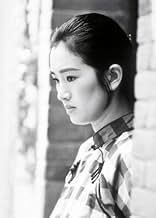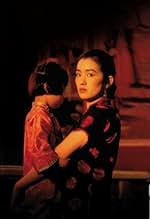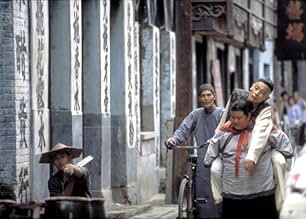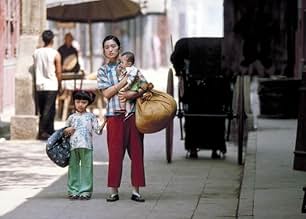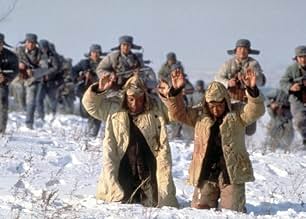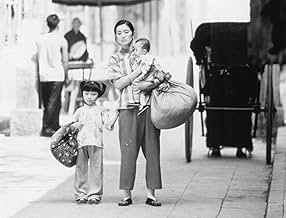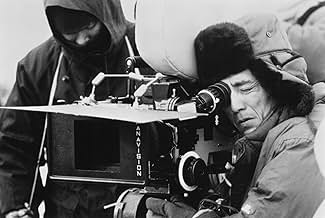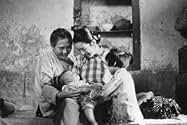Dopo che Fugui e Jiazhen persero le loro fortune personali, fondarono una famiglia e sopravvissero a difficili cambiamenti culturali negli anni '40 e '70 della Cina.Dopo che Fugui e Jiazhen persero le loro fortune personali, fondarono una famiglia e sopravvissero a difficili cambiamenti culturali negli anni '40 e '70 della Cina.Dopo che Fugui e Jiazhen persero le loro fortune personali, fondarono una famiglia e sopravvissero a difficili cambiamenti culturali negli anni '40 e '70 della Cina.
- Ha vinto 1 BAFTA Award
- 5 vittorie e 6 candidature totali
Recensioni in evidenza
'Huozhe' or 'To Live' takes us on a trip in China that will last us from the 40's through the 70's. Through that time, we will see life through the eyes of Fugui and Jiazhen, a husband and wife with 2 children, as well as Fugui's mother.
Fugui, the husband, has a gambling problem which will set off a chain of events that will have them lose the house, and eventually separate the family. Jiazhen, his wife, is forced to take a job which will put a strain on her children. Communist and nationalist armies battle each other, and the rise of Chairman Mao will affect them as well. Fugui will go through layers of mishaps that will change him forever. I don't want to detail anything more about the plot, it's much more worth viewing it and experiencing it then anything I can ever say here.
Not once is this movie boring, effectively placing us there, with the family. The acting seems so natural that it feels like you are there, traveling with them, rather then viewing them through a camera. This of course shows the strength of Zhang's directing. You Ge plays Fugui, a popular actor in China, won the award for the Cannes Film Festival. Li Gong is beautiful, and portrays her character with such passion, it's no wonder she has been nominated nearly a dozen times, winning most.
Emotional without being sappy, honest, & historically accurate, the film does have a black shroud covering it. In times of sadness, it's lifted a bit to allow us to see happiness, indeed, life, pull this family together. It even has bits of humor in it, at times, I laughed along with the family as much as I felt their pain. Little details, such paintings in the background that chip away as time goes by, shows how much care went into making this film. Characters that seem unimportant become part of the story later.
What a wonderful film. When I saw it 10 years ago, it not only changed the way I saw foreign movies, it also changed the way I see life and people. Any movie that can do that is one I highly recommend to anyone.
A perfect 10 out of 10.
Lantern was precisely contained within narrative walls, it abstracted life by placing us in the midst of turning cycles of life and wove cloths out of that turning in the form of rituals that marked passage; color, sound, weather, architecture. It was akin to a Buddhist mandala to me, a cosmic picture directing me to find my own place in the center of things, choose repose over madness.
Zhang by contrast here wanders unconstrained, under the auspice of history, aiming for a full chronicle of sorts of Chinese life as a family moves through the decades. The stage backdrop changes frequently; Civil war, Great Leap, Cultural Revolution.
We do still have the turning of cycles and it does create a (cosmic) picture; a life of comfort squandered by the man's ignorance who loses it all, to one of hardship and quiet abiding. But eventually it doesn't direct towards a center that will illuminate the turn as something more than the ramblings of history.
And it's simply not a very enviable position to want to be the chronicler of history like Zhang is trying to here, it reminds me of how Kusturica stifled himself in similar endeavors. It means our reference point always has to be an externally agreed version of reality and we have to be chained to that sweep.
You can see him try to root himself in something more essential - the husband becomes a puppeteer putting on shadow plays for the people, life as the canvas where these evanescent shadow plays are enacted, now losing a fortune, now gaining back your family, so that we could see it from the distance of transient flickers of drama. Civil war is introduced as someone hacking down the screen, revealing war as another play that demands its actors assume their place.
But this is forgotten in lieu of stopping at various points of history so that it ends up being more the Oscar winning type than history parting to reveal myriad reflections like Andrei Rublev. Had it come out from the West, I'm sure it would have won a few and the wonderful Gong Li her first. The best I got out of it eventually was the sense of a man and woman trying to make their way together as the skies shift and the stage quakes by the ignorance of unseen puppet masters enacting their little plays. The Great Leap castigated as a wall collapsing on a little boy, because the man who crashed his car and the boy were both overworked and needed sleep.
Zhang took care to color history within certain lines so that we veer close to the monumental failures of the era but never quite see the full brunt of the horror, famine or mass persecution, only bits of abuse in passing. It was still banned by Party hacks anxious to control the play.
I watched this movie because it had won the top award at Cannes. I hadn't high hopes for some reason, but I figured it was worth a look. I am very glad I did because it is a wonderful little piece that can be enjoyed with little knowledge of the regime against which it is set. The story follows the family's misfortunes and how they are affected by the rise of Chairman Mao. Their plight is touching as they suffer wrongs but also show compassion on others all the while trying to do the right thing by the system that is impacting on them. Even when tragedy occurs they never blame Communism but heap it on themselves instead.
This unfolds over many years with the rise of Mao as the backdrop. The parrellel between the two things is clear without being forced or rammed down our throats it's a wonderful bit of handling. Even better is the infusion of comic touches all the way through, the dialogue (even in subtitle form) is great and is witty and touching I laughed out loud many times.
Not having seen any other films by Zhang, I can only hope they are as good as this one. The cast, too, do a great job with the film. You Ge's Fugui is fabulous he is a draw from the start on, and his ageing is so convincing that credit must go not only to the makeup but also to Ge for doing so well with potentially tragic figure. Likewise Gong is superb but ages less convincingly. The support cast are all good from the children through to the figures of Mao like Jiang and Niu. The only thing that saddened me about the two great leads is to think that Western cinema will never care to have them in any films I guess that when it comes to Hong Kong cinema Hollywood only are interested if it has slow-motion and guns! (and they think they're cutting edge!)
Overall I find it very hard to fault this film as it has so much going for it on so many levels. Just as a human story it is excellent, and the historical context only serves to make it better. Comic and touching right to it's perfectly pitched close, this should be searched out by anyone who wants a genuinely moving human tale with political comment sown into each frame without intrusion.
TO LIVE (aka LIFETIMES - I dunno what the Chinese name is) basically covers 3 or 4 decades of one family's life in China, in a period that saw not one but two revolutions, and looks at the effect the social upheaval had on ordinary people's lives. The film rarely criticises the political movements instigated by Mao Tse Tung, but does an effective job of showing the hellishness of a society that has been turned on its head, where the people are forced to change not just the way they live but the way they think, and people are forced into social relationships that are new, and quite possibly against human nature.
I hope I won't jeapordise my visa if I admit that I had strong leanings towards Communism when I was younger, having read Marx in philosophy classes. His picture of a society without private possessions or social hierarchy did seem very appealing, but Marx acknowledged that the only way for such a society to work was if every member saw the value of it and willingly took part in it, and admitted that the only way that was likely to happen was via massive revolution - i.e. killing everyone that didn't agree with the plan. As a teenager, that didn't seem like such a big price or problem
Certainly I'm not the only person to have considered this price worth paying, and a couple of people have actually put the plan into practice - lamentably with less than stellar results. Mao Tse Tung is, I guess, the undisputed king of Communist revolution, having led TWO of them in China, and probably disrupting more peoples' lives than anybody else in history in the process. TO LIVE gives those of us that haven't had to live through such conditions some idea of what it might have been like. People used to the cushy capitalist western lifestyle might wonder just how on earth people can live through conditions like that, but that's the what the film wants to say... life might deal you some crappy hands, but people are remarkably adaptable and resilient, and you've just got to try to live the best you can. It sounds remarkably trite put like that, but the film does a good job of expressing it.
The film is based on a novel, with the author co-writing the screenplay as well. Zhang Yimou directs brilliantly as usual, which in this case is to recognise the strength of the story and characters and to back off a little, giving them space to live their lives. Although the film looks great throughout, the cinematography is quite unobtrusive. He once more elicits a great performance from Gong Li and the rest of the cast, with leading man Ge You giving the best one of all. The film has occasionally been criticised for throwing piling too much tragedy on, but this is never done in an exploitative/manipulative way, and Zhang Yimou avoids turning to melodrama to evoke an audience reaction... which makes him all the more likely to get one (and without the audience feeling used afterwards).
In a career full of magnificent films, TO LIVE stands as one of Zhang Yimou's finest moments. The film is epic yet remarkably simple, and the execution is as near to flawless as I've seen. I doubt that even Akira Kurosawa could have handled the material better, which is to say that Zhang Yimou surely ranks in the world's top echelon of film-makers. Long may his life and career continue
Highest recommendation!
It is easy to dismiss this movie as a "Sad period piece," but with another look, one sees that this is a story about triumph... of taking heart in the fact that one lives. The title, "To Live," is very apt, as we see the rises and falls of one small family living through the ups and downs of China during the pre-revolutionary era, the civil war, the Great Leap Forward, the Proletariat Cultural Revolution, and beyond.
This movie is at turns dramatic, humorous, touching, chilling, heart-wrenching, and triumphant. A true roller coaster of emotions, played out in the subtle tones only Chinese film can truly capture.
Lo sapevi?
- QuizInitially, Director Zhang Yimou was forbidden from filmmaking for 5 years by the Chinese Communist Party as a result of making this film. However, due to outside pressure this was later withdrawn.
- Citazioni
Little Bun: [playing with chickens] When will they grow up?
Xu Jiazhen: Very soon.
Little Bun: And then?
Xu Fugui: And then... the chickens will turn into geese... and the geese will turn into sheep... and the sheep will turn into oxen.
Little Bun: And after the oxen?
Xu Fugui: After oxen...
Xu Jiazhen: After oxen, Little Bun will grow up.
Little Bun: I want to ride on an ox's back.
Xu Jiazhen: You will ride on an ox's back.
Xu Fugui: Little Bun won't ride on an ox... he'll ride trains and planes... and life will get better and better.
I più visti
- How long is To Live?Powered by Alexa
Dettagli
Botteghino
- Lordo Stati Uniti e Canada
- 2.332.728 USD
- Fine settimana di apertura Stati Uniti e Canada
- 32.900 USD
- 20 nov 1994
- Lordo in tutto il mondo
- 2.332.728 USD
- Tempo di esecuzione2 ore 13 minuti
- Colore
- Mix di suoni
- Proporzioni
- 1.85 : 1
Contribuisci a questa pagina



